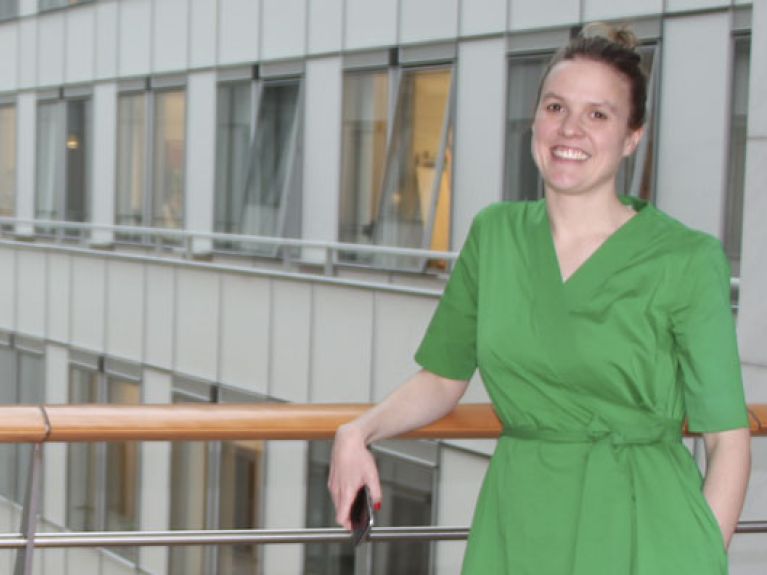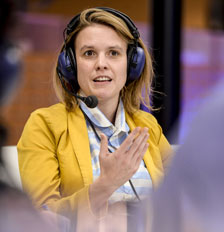“We must continue to build our Europe”
The German MEP Terry Reintke is the youngest woman in the European Parliament. She wishes more young people would have the enthusiasm she feels for Europe.

Terry Reintke’s website is dominated by the colours green and pink. The two colours send out clear messages: green stands for her party, Alliance 90/The Greens, and pink for women’s power. A series of photographs conveys the image of a young energetic woman with blond hair who doesn’t use much make-up and wears T-shirts more often than blouses. One of the pictures shows the politician with a megaphone and her fist in the air. This gesture seems brash and combative. She is smiling at the onlooker: candidly, honestly, compassionately. Anyone who experiences her in her everyday routine as a “green” MEP soon notices that this Internet image suits Theresa “Terry” Reintke.
 If you want to meet Terry Reintke at the European Parliament, you have to go through a security check like at an international airport. Following the attacks of March 2016, the checks in Brussels have become stringent. Reintke says that she feels even more part of Brussels since the attacks. It impressed her a lot how the population of Brussels stood together then and showed their grief in silent demonstrations. Since that time at the latest, says Reintke, she has been an inhabitant of Brussels by conviction. Furthermore, she appreciates the idiosyncrasy of the Belgian capital. Since May 2014 she has worked as a Member of the European Parliament, where she is currently the youngest woman. She will soon be 30 years old. Only two men who have stepped in to replace other MEPs are younger than her.
If you want to meet Terry Reintke at the European Parliament, you have to go through a security check like at an international airport. Following the attacks of March 2016, the checks in Brussels have become stringent. Reintke says that she feels even more part of Brussels since the attacks. It impressed her a lot how the population of Brussels stood together then and showed their grief in silent demonstrations. Since that time at the latest, says Reintke, she has been an inhabitant of Brussels by conviction. Furthermore, she appreciates the idiosyncrasy of the Belgian capital. Since May 2014 she has worked as a Member of the European Parliament, where she is currently the youngest woman. She will soon be 30 years old. Only two men who have stepped in to replace other MEPs are younger than her.
Young woman in parliament
How does she feel to be a young woman at the parliament? Following a morning at the Committee for Women’s Rights and Gender Equality, Reintke is sitting in the canteen, picking at a pasta salad. Her face straightens when she hears this question. “The hurdles you have to jump to be taken seriously in debates are higher than they are for men aged 40 or 50,” she says. She explains that there is great pressure to prove oneself in the work with all sorts of people from the European Commission and the European Council. “But if I first have to take a degree in a subject before I can open my mouth that doesn’t work.” Mistakes are part of the everyday routine. “If something goes wrong, then you get up and carry on,” she explains is a prerequisite for this varied job.
As a women’s policy spokesperson of the European Greens Reintke deals with gender equality issues for the parliamentary group. In addition to the Committee on Women’s Rights, she also sits on the Committee on Employment and Social Affairs and the Committee on Regional Development. Subjects like domestic violence and transgender issues are close to her heart.
On a common European basis
She comes from Gelsenkirchen in the Ruhr district and knows what impact political measures can have on a region. Since 2004 she has been active in the Greens, which she considers more than an “exclusively eco-party”. Terry Reintke studied political science in Berlin and Edinburgh from 2006 to 2011. Afterwards she spent two years as spokesperson of the Federation of Young European Greens. She speaks fluent English, which helps in the multicultural parliament where so many different policies are made, but “on a common European basis”. Although there is increasingly frequent speculation about a disintegration of the European Union, Reintke sees the EU as a “model of the future that shows how you can deal with the transnational challenges of the 21st century”. Now especially, she says, everything depends on young people. “We must pitch in and continue to build our Europe.” She wishes more young people would have the enthusiasm she feels for Europe. She contributes as much as she can to this herself. When other people of her age can call it a day and go for a beer with friends, Reintke is often still poring over the files preparing for her next day.
Long working days
Members of the European Parliament have 40 weeks of sessions a year. That is almost twice as many as in the Bundestag, the German parliament. Reintke has long working days in Brussels and also at the Strasbourg Parliament, where she travels once a month. During the so-called committee weeks she often begins with a “breakfast meeting” at 8 o’clock in the morning, followed by one appointment after the other until late in the evening. Reintke recently agreed with her team to take one weekend a month off. This also means perhaps saying no when a TV station calls about appearing in a talk show. “If we claim to be ‘normal people’ who just happen to hold office, then there has to be room for private life,” says Reintke.
Lots of pictures of family and friends hang on the walls of her small office. A sheet of paper above her desk says “You can surpass yourself”. She also maintains contact on Twitter, where she has over 6,600 followers. Her Facebook account has even more. That is political work, too, with which she probably mainly reaches younger people. And nevertheless she believes: “Politicians must again spend more time knocking on people’s doors.” She personally enjoys that. What Reintke especially likes about her work is discussing issues with people, including those who do not have the same opinion. She willingly takes to the streets to shape an “open society”.

